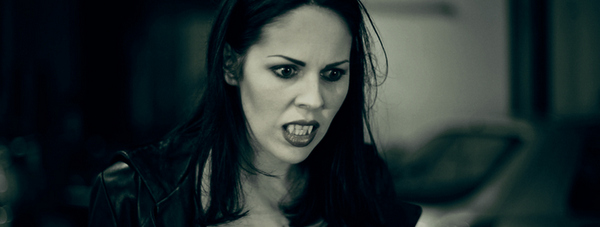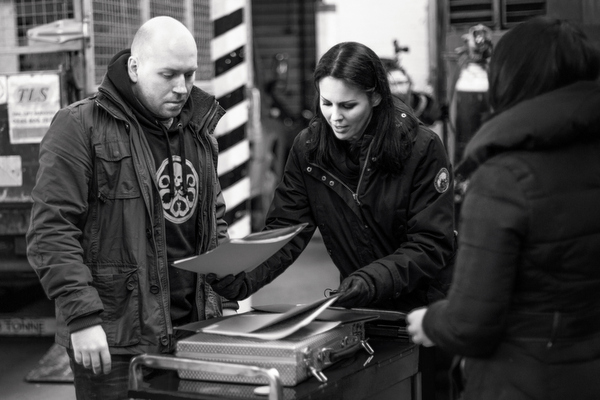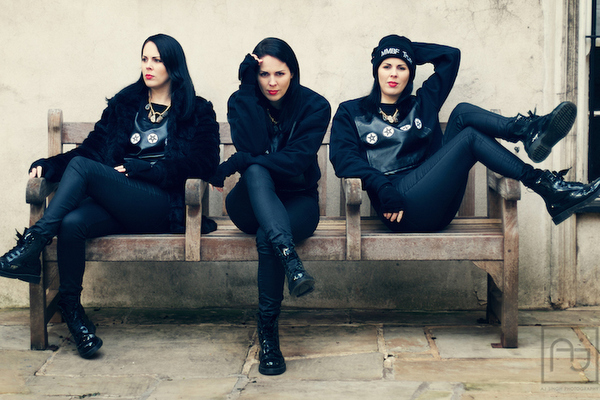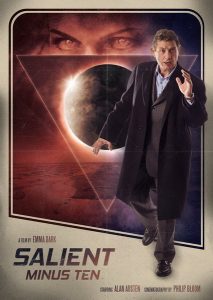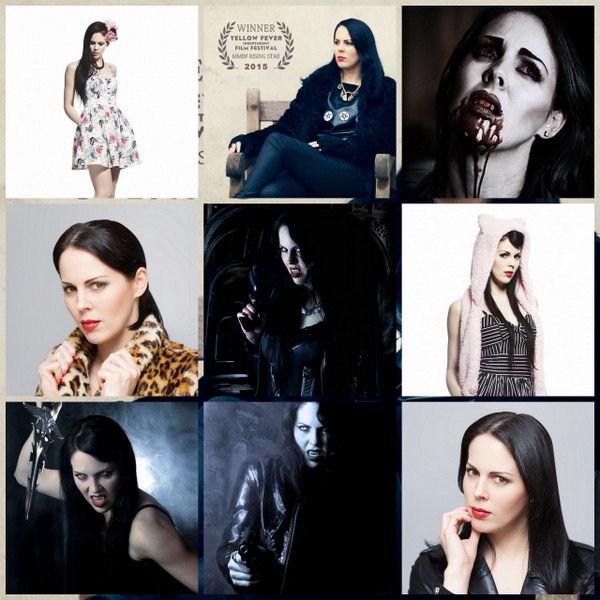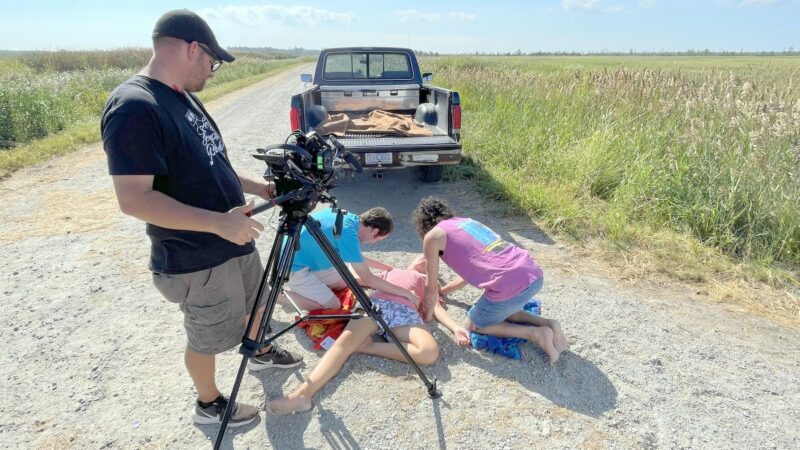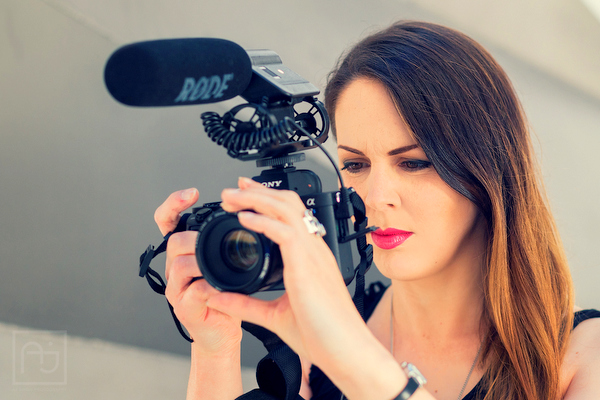
“EMMA DARK is an award-winning filmmaker, actress and model, specialising in the horror, sci-fi and fantasy genres. She started modeling in 2008 and quickly made a name for herself working with highly respected independent boutique designers and creative photographers on the alternative scene in London and beyond.
In 2010 she modeled for the incredibly popular Hell Bunny and Spin Doctor labels, and in 2011 went on to be published in Natasha Scharf’s book Worldwide Gothic: A Chronicle of a Tribe. In 2012 she featured as Miss April and July in Jason Juta’s annual fantasy calendar and won World Goth Day’s Best Model, which was covered by Cosmopolitan and various other media machines.
In Autumn 2012 she joined dark synthpop band X-KiN as their female vocalist, and appeared in the band’s music videos. Less than a year later, in spring 2013, Emma went on to star in BEF/Kim Wilde horror themed music video ‘Every Time I See You I Go Wild’, featuring heavily in the final cut. This experience ultimately led Emma to switch focus from modeling and singing to acting and filmmaking.
I’ve been nominated for the Winter 2017 ‘Outstanding Female Filmmaker’ Award at @StormyWeatherHF! #WomenInFilm #WomenInHorror #WiHM #Horror pic.twitter.com/jRj12RHt0y
— Emma Dark (@EmDarkOfficial) January 10, 2017
2014 saw her moving forward in her film career, taking part as an official judge at the prestigious British Horror Film Festival, and producing/directing horror fan short ‘Island of the Blind Dead’ (2015) with fellow filmmaker Merlyn Roberts. As 2014 drew to a close Emma embarked on her greatest challenge to date, her first self-produced and directed, horror/action short ‘Seize the Night’ (2015)
In 2015 Emma’s work on ‘Seize the Night’ went on to win her the notable MMBF Rising Star award at Ireland’s The Yellow Fever Independent Film Festival. The film garnered favourable reviews from a multitude of respected genre websites including Dread Central, Starburst and UK Horror Scene, as well as a news article on the official AMC’s Horror Channel website.
As the film gained momentum ‘Seize the Night’ and Emma Dark featured in comprehensive national print articles, including front page mentions, in the UK’s leading horror magazine Scream, and indie filmmaking favourite Digital Filmmaker Magazine. Emma also featured in online cult magazines Malevolent (US) and The Digital Dead (UK), and participated in a multitude of web, video and radio
Other achievements in 2015 included returning as a judge at the British Horror Film Festival, the honour of having an MMBF horror achievement award created in her name, and narrating a storytelling based segment for Richard Gladman’s ‘Fragments of Fear’, alongside classic horror greats Caroline Munro and Francoise Pascal. Additionally, Emma featured as an official signing guest at KnightCon 2014, Digi-Con 2015, and bi-monthly cult film event the Camden Film Fair in December 2015.
2016 was another action packed year for Emma, attending Doncaster’s Digi-Con2, Birmingham’s MCM Comic Con, Rochdale’s Dale-Con 4, Sheffield’s HorrorCon UK, Scifi Wales and Bristol Horror Con as a special signing guest.
May 2016 saw the online release of Emma’s film ‘Seize the Night’, which was covered by a wide range of media channels, receiving a positive critic and audience reception. It also saw Emma dubbed an honorary patron of the arts for London’s esteemed Misty Moon Film Society, and starring in Misty Moon and Robo Film’s ‘Frankula’ alongside Hammer Horror scream queens Caroline Munro and Judy Matheson, and television star David Barry of ‘Please Sir!’ fame.
September 2016 saw Emma grace the front cover of issue 39 of internationally distributed independent filmmaking magazine – Digital FilmMaker Magazine – heading an article charting the rise of female filmmakers. January 2017 then saw Emma take over the monthly ‘Ask the FilmMaker’ column in Digital FilmMaker Magazine from previous columnist Sean J Vincent.
Did you study what you do
No I didn’t at all. I come from an artistic and technical background and filmmaking for me is a way to express both of those parts of me in a way that works.
What is your filmmaking process
I can describe myself as a messy organised person. Which means I am fairly methodical and mostly logical but it might take a lot of thinking to get there as my creative mind is always on the go at the same time. So there is no set process for me save to explore every possibility at every part of the process, work hard and then take the most logical route to achieve my goals.
Do you take courses to improve your craft
I don’t no, not at this point in time, I wouldn’t rule out taking some. For me it’s generally a mix of research on the net and trial and error practically. I do like reading about the experiences of other filmmakers and learning what worked for them and what didn’t, I think that’s pretty invaluable.
How do you combine acting, producing and directing
With difficulty! As much as you can you need to try and switch between those mindsets and still keep on top of everything. I don’t have a particular method of doing it bar taking a moment to step back at key points and assess what ‘hat’ I’m wearing at which point in time and then pick the most logical outcome while trying to stay creatively organic within the process.
How did you get into the film business
It’s not a business for me, but I fell (head first) into filmmaking after acting in a few music videos and a brief stint interviewing other filmmakers. I decided it was something I wanted to try, and I’m glad I did, I’m very passionate about it.
How do you turn an idea into a screenplay
Well there are probably set ways you ‘should’ do this, and trained screenwriters certainly will implement those, but for me it’s simply trying to figure out what may or may not work on screen and getting the pacing and dialogue right. I had a trained screenwriter in the form of US based writer Rick Humphries for my first serious film “Seize the Night”, he did a wonderful job of breaking down pacing and dialogue. For my most recent film (currently in production) “Salient Minus Ten” I did this myself as it’s a slightly more abstract and heavily visual film. I would advise anyone looking to implement a lot of dialogue or complex storylines to seek out and work with a competent screenwriter such as Rick, it can be an invaluable part of the filmmaking process.
Explain your acting process
For anything I do I try to imagine I am that character, I try to feel what that character feels, as naturally as possible. I’m not a trained actor, but I do have a substantial amount of experience in modelling, which requires a similar process. It’s much easier for me to play characters that I can associate with in some way, the results on camera are better. In terms of getting into character the more I can rehearse with other actors present the more I can get into the character’s mindset. With my character Eva in “Seize the Night” you can clearly see that I’m much more natural with the ‘angry’ performances, having things go wrong on location and all the general frustrations you come to know with filmmaking enabled me to channel that and build upon it for the role.
What writing tip or idea can you give young actors
If they are serious about acting as a paid career option they probably need training in some shape or form unless they already have a strong industry connection. Then they need to build up as much experience as they can. One of my pet peeves is newly trained (or untrained) actors expecting to walk into lead roles and/or commanding an unreasonable rate. Paid work can be found in bigger productions, for example Hollywood feature films, however it’s more than likely those will be extra or smaller featured roles. With most truly independent film often there is only budget for expenses and sometimes not even that. As I do myself I would advise any new actor to look primarily at the quality of the project. Are they excited about the part and the project, do the filmmakers have a track record for quality, will they be promoted? That to me is the real gold, not money.
Tell us about the directing work you have done
I have produced and directed three films to date: “Island of the Blind Dead” (2015) which I directed with fellow filmmaker Merlyn Roberts. “Island of the Blind Dead” is an homage to the Blind Dead film series from the 1970’s and despite a disclaimer before the film rolls it’s consistently mistaken for lost footage from the real article, which is quite a compliment.
The second (and much more serious) film I directed is “Seize the Night” 2016. “Seize the Night” was my second short film. It’s a slick vampire vs werewolves Action/Horror, did well on the festival circuit and gained lots of media attention.
“I’m currently in the post production stage of my latest short film “Salient Minus Ten” – a Sci-Fi/Horror short film. I’m very excited about this film, I have a brilliant lead actor in the form of Star Wars’ Alan Austen, and internationally renowned DoP Philip Bloom, who has shot some absolutely magnificent footage.” – Emma Dark
What do you want to change about the film business
There are three things that are the biggest blockers of all for me. Firstly the amount of support financially and logistically for small independent filmmakers by the government. Funding is hard to get, especially for genre works, and most government and private bodies seem to want to charge the same amount as say they might charge to the BBC for filming permits. Secondly internet piracy is at an all time high and the government is taking very little action to stop it. This is absolutely crippling for small filmmakers who have investment funding to pay back, even Hollywood filmmakers. I’ve had debates with people who think it’s OK to steal because something is ‘online’ or have a misconception that independent filmmakers are raking in cash. It’s not the case, not by a long chalk, and even at the Hollywood level people will and are suffering and losing jobs because of this. Thirdly I’d like to see all festivals programming films on their artistic merits alone and not their premiere statuses or any other non-creative reason.
What do you want to be remembered for
Making great films (hopefully), and being an approachable, open and honest person.
What do you want from an actor during production
Several things are important for me. Firstly an ability to look/sound natural on camera, this is paramount. But equally as important is the attitude of an actor. You have to be able to get along with someone, and for that person to maintain a professional attitude at all times. Also I really only work with people who are excited about and interested in the project. I think that even with some of the very well known Hollywood actors on big budgeted films if they aren’t really ‘into’ a project or role it does come across on screen.
What do you want to work with a producer during production
I produce my own films. I can see the advantage of bringing production managers on for larger scale films but at my level I’d rather take on the extra workload myself as I know I have a vested interest in making sure a film is as good as it possibly can be.
What do you think a director can do to get into the film business
In terms of the industry as a money making career? I don’t know to be honest, I couldn’t try and claim to. I suspect the only way you can make a living wage for narrative fiction works is to get picked up on contract for larger films, this of course requires you to prove yourself on the back of your own projects though. My best advice is if you want to do something just go out there and do it. These days people can make a film on a mobile phone, just work to your available resources. One thing most people forget, or perhaps simply don’t feel confident enough for is marketing. Are you proud of your work? Do you want to make sure that the people who helped you create it are recognised? Then you need to talk about it. It costs nothing to self market your film. Contact film blogging sites, send screeners for review etc., don’t be afraid of the word ‘no’.
Who is your favorite director
Generally I don’t have favourite directors so much as I have favourite films, but if I had to pick someone I would say Quentin Tarantino.
Why is this director your favorite
I do like his style and films but most of all I love his attitude. He’s so positive and inspirational, he’s not afraid to push boundaries, and he has a genuine love of film.
What advice will you give young directors around the world
Push boundaries, be creative, hold your vision but be open to suggestions and organic changes. Treat people with the same respect and courtesy you would like to be treated with. Collaborate, innovate and stay passionate.
What do you want to be remembered for
I want you to know and remember me for making you think, feel or laugh through great storytelling.
Website | Facebook | Twitter | Vimeo | IMDB | LinkedIn | Instagram |
INTERVIEWS
In Conversation with Michael Oblowitz Director of Confidential Informant
Confidential Informant stars Mel Gibson, Dominic Purcell, and Kate Bosworth
more interviews

